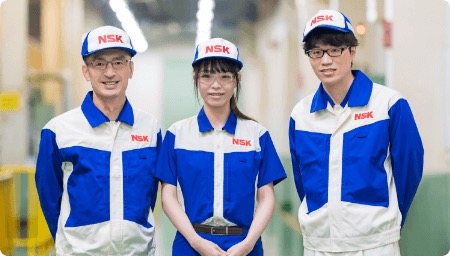Vol. 3
Building a data-driven future for NSK
Data-Driven Planning and Promotion Department, Digital Transformation Division HQ
Vol. 3
Building a data-driven future for NSK
Data-Driven Planning and Promotion Department, Digital Transformation Division HQ
Team Members
-
 Department HeadMakotoMid-career hireJoined NSK in 2021 as a mid-career hire. Makoto previously worked for a consulting firm, where he specialized in digital transformation (DX), business process re-engineering (BPR), global enterprise resource planning (ERP) implementation, and governance enhancement. At NSK, he first worked to develop a DX promotion plan and establish an organization tasked with digital transformation of the company's operations, before working on company-wide change management, developing personnel competent in digital technologies, and promoting the use of AI. Since 2024, as head of the Data-Driven Planning and Promotion Department he has spearheaded a range of initiatives aimed at transforming NSK into an even more data-driven organization.
Department HeadMakotoMid-career hireJoined NSK in 2021 as a mid-career hire. Makoto previously worked for a consulting firm, where he specialized in digital transformation (DX), business process re-engineering (BPR), global enterprise resource planning (ERP) implementation, and governance enhancement. At NSK, he first worked to develop a DX promotion plan and establish an organization tasked with digital transformation of the company's operations, before working on company-wide change management, developing personnel competent in digital technologies, and promoting the use of AI. Since 2024, as head of the Data-Driven Planning and Promotion Department he has spearheaded a range of initiatives aimed at transforming NSK into an even more data-driven organization. -
 Group ManagerNanaMid-career hireJoined NSK in 2019 as a mid-career hire. Nana previously worked for an IT systems company, where she developed, operated, and maintained design systems and ordering systems for the manufacturing industry. After joining NSK, she worked in system operation and maintenance in the company's technology divisions before transitioning to Digital Transformation Division HQ. In her current role, she utilizes her ability to analyze and interpret existing systems, which she has developed through her years of experience, to identify issues in the production, technology, and business domains, as well as supporting user divisions in making optimal use of their data.Comment from Department HeadCommentNana uses her communication skills to bring together departments, which can often become siloed in such a large company, in order to solve challenges. The experience in system development and operation she gained in her previous job has given her a strong understanding of the importance of the user perspective, and she is skilled at coordinating with all the key stakeholders in a project to advance proceedings smoothly. She is always curious about new technologies and business fields, and I know I can rely on her to tackle new challenges proactively, even in areas that are new to her.
Group ManagerNanaMid-career hireJoined NSK in 2019 as a mid-career hire. Nana previously worked for an IT systems company, where she developed, operated, and maintained design systems and ordering systems for the manufacturing industry. After joining NSK, she worked in system operation and maintenance in the company's technology divisions before transitioning to Digital Transformation Division HQ. In her current role, she utilizes her ability to analyze and interpret existing systems, which she has developed through her years of experience, to identify issues in the production, technology, and business domains, as well as supporting user divisions in making optimal use of their data.Comment from Department HeadCommentNana uses her communication skills to bring together departments, which can often become siloed in such a large company, in order to solve challenges. The experience in system development and operation she gained in her previous job has given her a strong understanding of the importance of the user perspective, and she is skilled at coordinating with all the key stakeholders in a project to advance proceedings smoothly. She is always curious about new technologies and business fields, and I know I can rely on her to tackle new challenges proactively, even in areas that are new to her. -
 Data EngineerAtsuhikoMid-career hireJoined NSK in 2022 as a mid-career hire. At his previous job as a programmer, Atsuhiko was involved in system development, operation and maintenance, supporting improvements in work efficiency, and implementing in-house IT systems. After working on the digitization of legal and human resources operations, he joined the Data-Driven Planning and Promotion Department, which aims to support departments across the company as they work to digitalize their operations. Currently, he is working to develop data infrastructure, create and provide support for use of business intelligence (BI) tools, and train NSK's employees in data utilization, with a particular focus on the financial and administrative fields. He specializes in introducing and promoting the use of programming and digital tools, and launching new initiatives.Comment from Department HeadCommentAtsuhiko has a great sense of balance. His strength lies in his flexibility and ability to propose optimal solutions, even for projects that involve a cross-organizational workflow or complex stakeholder management. His comprehensive approach to organizing and implementing tasks is a great asset to the team.
Data EngineerAtsuhikoMid-career hireJoined NSK in 2022 as a mid-career hire. At his previous job as a programmer, Atsuhiko was involved in system development, operation and maintenance, supporting improvements in work efficiency, and implementing in-house IT systems. After working on the digitization of legal and human resources operations, he joined the Data-Driven Planning and Promotion Department, which aims to support departments across the company as they work to digitalize their operations. Currently, he is working to develop data infrastructure, create and provide support for use of business intelligence (BI) tools, and train NSK's employees in data utilization, with a particular focus on the financial and administrative fields. He specializes in introducing and promoting the use of programming and digital tools, and launching new initiatives.Comment from Department HeadCommentAtsuhiko has a great sense of balance. His strength lies in his flexibility and ability to propose optimal solutions, even for projects that involve a cross-organizational workflow or complex stakeholder management. His comprehensive approach to organizing and implementing tasks is a great asset to the team.

Toward a data-driven organization that
makes optimal use of internal data
With the rapid shifts in the business environment in recent years, it has become
increasingly important for all employees to make effective use of data in order
to increase the speed and accuracy of decision-making. Amidst this environment,
the Data-Driven Planning and Promotion Department (DDPP) was established with
the goal of transforming the company into a data-driven organization. As
company-wide system projects progress, including the renewal of the company's
core sales, production, and accounting systems and the development of a supply
chain structure for key manufacturing operations, DDPP aims to contribute to
business and create added value by utilizing the vast amount of data generated
from these projects.

Leveraging a variety of data to propose solutions to business challenges
During the department's start-up phase, the team firstly focused on raising
awareness of DDPP and its mission within the company and supporting the utilization
of in-house data, with a focus on proof of concept. The team started by developing a
variety of mechanisms, including visualizing and supporting analysis of key KPIs in
business and human resource management, developing tools for company-wide use of
generative AI, and building an IoT utilization platform for visualizing analog and
non-digital equipment at manufacturing sites. This work laid the foundation for
full-scale initiatives in the following fiscal year and beyond.

Repeated discussions on how to add new value to the company
How does the team approach its work?
 Makoto
Makoto
Our goal is to create an environment where everyone has access to the data
they need, when they need it, and can use this data to make decisions. We
established DDPP in April 2024 and began by working to identify the data
possessed by each department, how this data is currently utilized, and the
challenges departments face in making effective use of this data. To address
some of these individual challenges, we created a simplified analysis
environment using no-code platforms and Python to facilitate data
visualization and utilization.
 Nana
Nana
Each of the company's departments have conducted data analysis in the past.
However, as the volume of data increased and tools evolved, we needed to
examine whether traditional methods were sufficient or whether new methods
could be incorporated to increase the efficiency and sophistication of this
analysis. We therefore began by visiting each department to give them a
first-hand taste of what is possible with new data analysis methods.

What were some of the difficulties and challenges you faced?
 Nana
Nana
I tried to be make new methods as accessible and familiar to people as
possible. When introduced to something new, asking yourself “Is this really
necessary?” “Do we really need to go that far?” is a natural response.
That's why we started by creating a very simple sample tool, and then worked
to develop it further and promote its use through consultation with members
in the respective departments.
 Atsuhiko
Atsuhiko
We create simple mock-ups to give departments a better sense of the new
value these tools can deliver. As part of this process, we needed to gain an
in-depth understanding of each department's operations and identify the big
picture. Developing hypotheses that are aligned with business operations
allows us to find the optimal functionality for each department and make
effective proposals.
 Makoto
Makoto
Although departments may find the new methods we propose interesting, there
is still a long way to go before they actually incorporate these
technologies into their operations. For example, talented employees possess
a variety of knowledge from their past experiences and are able to perform
their work effectively by drawing on this database in their brains. Simply
by looking at the numbers in an Excel sheet, they are able to visualize the
events that are occurring behind the scenes. Although it requires vast
experience to achieve this level of insight, with the business world
changing at an unprecedented pace, experience alone is not enough to address
these uncertainties. In today's world, it is necessary to visualize
information and make decisions based on data, even in areas in which we have
no prior experience.

What makes this department special?
 Nana
Nana
For me, it's the team atmosphere where we can openly express our opinions to
each other. Everyone in the team will repeatedly discuss matters and try to
understand where the others are coming from. Even at times when we bring our
different perspectives to the table, we always manage to maintain harmony
thanks to Makoto's ability to guide the flow of the discussion and
Atsuhiko's cool-headed approach to problem-solving.
 Atsuhiko
Atsuhiko
Our discussions are always active and take place in a flat environment,
where we all speak up regardless of age or experience. Things are not
operated in a top-down fashion, with the leader dictating policy. Instead,
all members discuss the issue and come to decisions on a case-by-case basis.
I personally feel that the atmosphere is like a university research lab.
Information is shared among the team quickly, meaning that the person
responsible is never stuck to wrestle with a problem alone. We always keep
each other up to date through regular online meetings and chats.


How do the ther team members help you in your work?
 Makoto
Makoto
No matter what their position, everyone in the team thinks independently and
takes initiative in their work, so there is no need for me to give them
detailed instructions. It is also important to constantly reassess our
direction as we take in new information, and the team is always very
flexible and responsive in quickly adapting to changes in policy based on
the circumstances.
 Nana
Nana
Working with this team, there is always new input every day, and the other
members will point out areas that I might lack in my current perspective. I
am thankful for these new experiences and the opportunity to grow each day
as we work toward higher goals.
 Atsuhiko
Atsuhiko
While I am good with technology and problem-solving, I do not have much
experience in bringing stakeholders together to advance a project. I am
thankful that Makoto and Nana perform this role so effectively, which allows
my to concentrate on my own responsibilities.


What is the appeal of working on DX at NSK?
 Nana
Nana
People tend to think that advanced statistical knowledge is required in
order to perform data analysis, but NSK is currently working to develop a
full-scale framework that allows regular users to utilize their data more
effectively. During the current phase, what is most important is an ability
to understand the operations of each department and to consider how to make
the most of the available data. You don't necessarily need advanced
technical skills to be successful, and there is a wide range of
opportunities for people with diverse skill sets.
 Atsuhiko
Atsuhiko
NSK's data-driven initiatives are just getting started. This means there is
an opportunity to gain valuable experience beyond data analysis, such as
building a foundation for collecting data and gaining a first-hand insight
into the operations of the various departments within a company. We welcome
new colleagues who are interested in discussing how the team can work
together to achieve our goals. The experience you gain is so much more than
the job title of data scientist might imply.
 Makoto
Makoto
As Nana and Atsuhiko mentioned, NSK's quest to become an even more
data-driven organization has only just begun. When we discover something new
from the data, no matter how small, these insights represent the first step
toward creating new value. I look forward to welcoming new members to our
team as we work to generate new value together!




